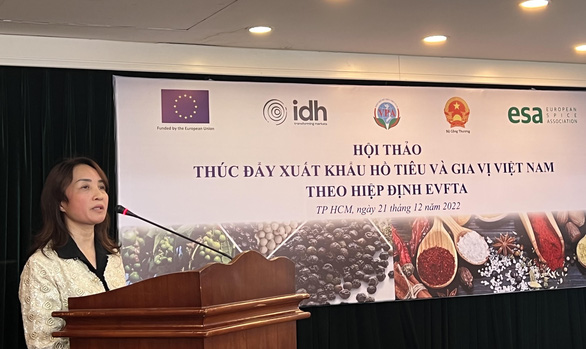The US, China, United Arab Emirates, India, Germany, and the Netherlands were among the biggest importers of Vietnamese pepper.

To sustain its position as the world’s largest producer and exporter of black pepper, Viet Nam’s pepper sector needs to focus more on improving product quality, strictly conforming to socio-economic and environmentally sustainable production criteria, and developing more value-added products for export, speakers told a seminar in HCM City on Wednesday.
Speaking at a seminar on promoting Viet Nam’s pepper and spice exports under the EU - Viet Nam Free Trade Agreement, Hoang Thi Lien, chairwoman of the Viet Nam Pepper Association, said Viet Nam earned US$950 million from pepper exports last year, accounting for 44.2 per cent of the world’s total pepper exports.
The country exported 211,507 tonnes of pepper for a value of $911.1 million in the first 11 months of this year, a year-on-year decrease of 14.9 per cent in volume but an increase of 3.9 per cent in value. Black pepper accounted for 183,708 tonnes and white pepper accounted for 27,799 tonnes of the exports.
The US, China, United Arab Emirates, India, Germany, and the Netherlands were among the biggest importers of Vietnamese pepper.
Europe and the US are the largest importers of black pepper in the world, together accounting for approximately one-third of global imports.
The EVFTA, which entered into force on August 1, 2020, has enabled certain Vietnamese spices and herbs, such as ground or crushed pepper, chilli, vanilla, and cloves, to enjoy zero tariff duties when exporting to the region.
Currently, only four Asian countries (Japan, South Korea, Singapore and Viet Nam) have signed FTAs with the EU, so compared to other pepper producing and exporting countries such as Indonesia, India and Malaysia, Viet Nam has an export advantage to the EU, she said.
However, enterprises have encountered certain challenges when exporting to the EU market, including strict quality requirements, especially limiting residues of toxic chemicals, and sustainability standards, she said.
Exporters need to monitor the market closely, as requirements change frequently, she said.
Nguyen Nhat Minh from Vietnam Insight, a market research company, said all pepper exported to the EU must be safe for consumption.
Businesses want to access the EU market, in addition to ensuring stable and sustainable sourcing, food safety and product quality, they also need to pay attention to ethical business practices in their production process, such as ensuring the safety of employees, she said.
EU customers are increasingly interested in buying products that are good for their health and made by businesses that contribute to community development and the environment, she added.
She also said that there is increasing demand for certified organic products and value-added black pepper from the EU region.
Lien said enterprises need to improve their capacity to meet the requirements of the import market, such as ensuring food safety and hygiene and gaining sustainability certificates while churning out value-added products for export.
Farmers need to change their mindset regarding production by shifting from quantity to quality and sustainability, she said.
The sector also needs to increase export of processed products and enhance trade promotion programmes, she said.
Besides that, close cooperation among exporters, processors and producers is needed to ensure the value and sustainable development of the pepper sector, she added. — VNS
- Tags
- Pepper export





